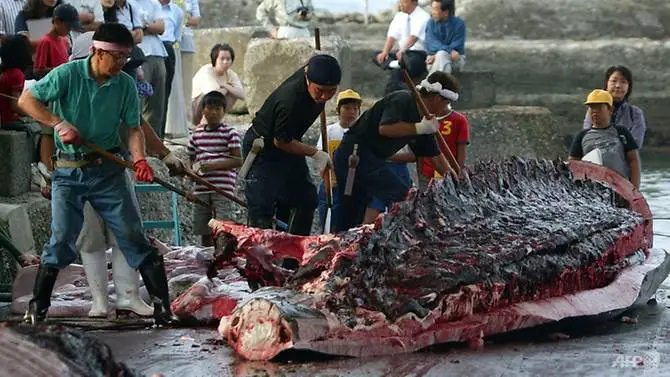'A way of life': Japan's whalers back treaty withdrawal
31 January, 2019

Neatly lining up sliced whale meat to make "jerky" in the wintry sea breeze, Tetsuya Masaki says whaling is just part of daily life in his tiny Japanese community of Minamiboso.
Japan sparked outrage in December when it decided to withdraw from the International Whaling Commission, saying it would return to commercial whaling as part of its cultural heritage.
Rarely is that heritage more in evidence than in Minamiboso, a town on the Pacific coast some 70km south of Tokyo that is home to Gaibo Hogei, one of a handful of remaining local whaling companies.
Masaki, 32, a processing factory worker for Gaibo Hogei, admits that the local whaling industry has shrunk but says it is still an "indispensable" part of the town - especially during the summer whaling season.
The firm allows local residents and tourists to watch whales being dismembered at its slaughterhouse as part of efforts to keep alive the region's 400-year-old whaling history.
???????Local schoolchildren also come to the seaside facility where they can get a closer look at the rare sight of workers stripping the flesh from the thick skin of whales with special choppers.
Gaibo Hogei's president, 57-year-old Yoshinori Shoji, said Japan's decision to withdraw from the IWC was "far too late but the right answer", adding that he backed it "100 per cent".
Shoji's firm annually harpoons 26 giant beaked whales - a type not covered by the IWC but subject to domestic Japanese quotas - and lands them at Wada port, one of the country's five bases for coastal whaling.
He said he was gearing up "as a matter of course" to resume commercial whaling of minke whales - protected under the treaty - once Tokyo formally leaves the IWC in June.
"REGIONAL SPECIALITY"
Tokyo's decision sparked a firestorm of criticism from environmentalists and anti-whaling countries such as Australia, New Zealand and Canada.
It was a rare piece of provocative diplomacy by Japan, which has generally pursued an uncontroversial foreign policy since its World War II defeat.
But a poll in January by public broadcaster NHK suggested that a majority (53 per cent) of people backed the withdrawal decision, compared with 37 per cent opposed.
Japan vowed to forge ahead with commercial whaling of minke and other whales off its coast but said it was stopping its most provocative whaling - annual Antarctic expeditions that used an IWC loophole permitting hunting for scientific research.
The country makes little secret of the fact that much of the meat from the "research" ends up on the dinner plate, and local Minamiboso resident Kazuo Tachikawa is proud that whale meat is a "regional speciality".
"You can buy whale meat at all supermarkets and seafood shops here," the 70-year-old said at a roadside station, where a huge model of a blue whale skeleton stands alongside harpoon guns.
But other locals appeared unmoved by the controversy.
"I would be concerned if it were tuna or other fish," said Sadae Nakamura, a 67-year-old housewife.
"I even don't know the difference between research whaling and commercial whaling," she laughed. "It's all politics that is beyond people like me."
In terms of politics, many members of Prime Minister Shinzo Abe's conservative Liberal Democratic Party are supporters of whaling, and he himself comes from a constituency where whale hunting remains popular.
"NOSTALGIA" FOR WHALE MEAT
Japan has hunted whales for centuries and the meat was a key source of protein in the immediate post-World War II years when the country was desperately poor.
But consumption has declined significantly in recent decades, with much of the population saying they rarely or never eat whale meat.
"Those who have interest in eating whale meat are extremely limited" in Japan, said Hisayo Takada, programme director at Greenpeace Japan, adding that Tokyo appears to be hitting back emotionally at foreign pressure over the practice.
"It's hard to believe the decision will lead to a rapid expansion of Japan's whaling industry," which is much smaller than fishing, added Takada.
At a Tokyo restaurant serving up whale sushi and cutlets, 70-year-old pensioner Kunio Adachi admits that he only dines on whale out of "nostalgia".
"I support the status quo," he added.
TAG(s):
